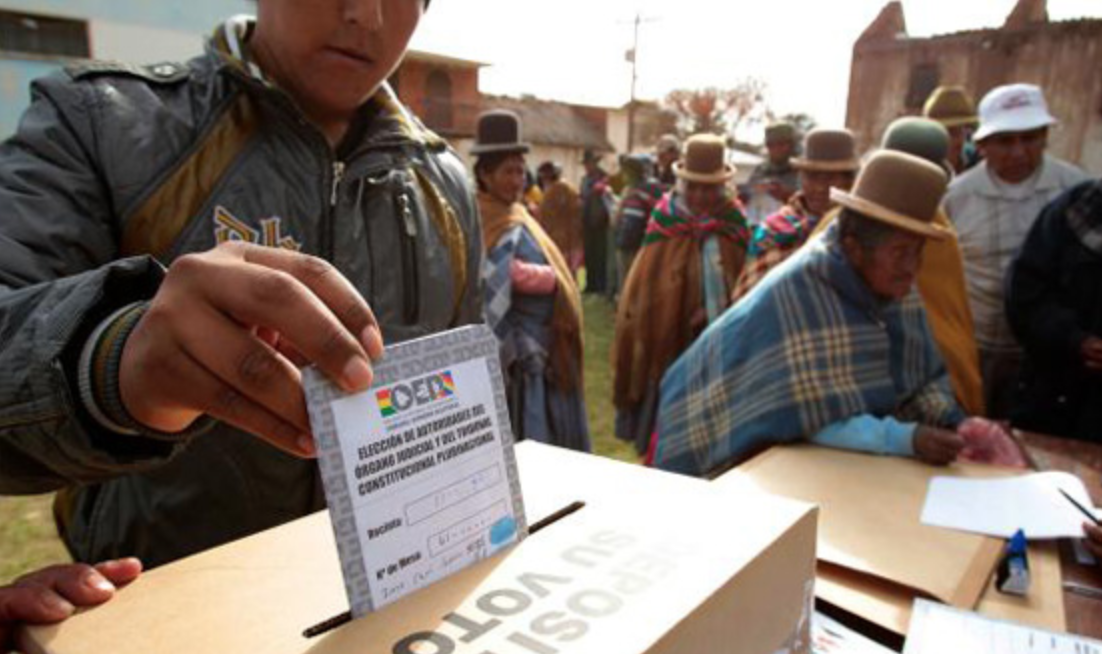Subjection to the rule of law in the strict sense has been a pending task in Bolivia since its independence. Bolivia occupies the unfortunate position of 130 on the global Rule of Law Index. The Economist systematically categorizes Bolivia as a hybrid regime in the democracy index, that is, it is not a democracy. Apparently, the country’s performance in terms of respect for human rights, judicial independence, the fight against corruption, respect for the opposition, and freedom of the press, among others, is as outstanding as its soccer performance.
Few things have remained constant in the country of social movements and political ruptures, one of them is its justice system in which interim appointments abound, uncertainty in the appointment of high magistrates, questionable appointments of judges and prosecutors, and the shortcomings of the Bolivian penal system. By changing two or three lines, the 2009 IACHR report could very well be describing the current situation in the country in 2023. Namely, the selection process of magistrates for the highest Courts of justice is, as always, mired in a worrying uncertainty to which the population is already indifferent.
After having been convened on March 27, 2023, the process of selection of magistrates was annulled on two occasions, with accusations of bias, by constitutional actions that, coincidentally, ended up in the hands of magistrates who seek to run for different Courts (a strategy to circumvent the prohibition of re-postulation), leaving patent a sort of judicial horse-trading. Last May 18, the Chamber of Deputies declared a fourth intermission in the debate to put the process of selection of magistrates back on track, after weeks of paralyzation because its first vice president had ordered to prepare dinner… they met again on May 24, approving a law to reduce deadlines, but the continuity of the procedure still depends on the Constitutional Tribunal.
Something similar happened in 2022 with the selection of the Ombudsman. There was no agreement for a transparent convocation and the official majority was imposed on March 18, 2022. The ruling party and the opposition delayed to the point of exhaustion the appointment of the new Ombudsman. It seemed that the ruling party would not be able to impose a candidate since it did not have two-thirds of the chamber votes and a consensus would be forced. However, on September 23, 2022, the ruling party finally managed to appoint its candidate, taking advantage of the massive absence of the opposition, which was celebrating the Santa Cruz festivities.
However, the most worrisome aspect of the Ombudsman selection process was not the result, but the path. In between, a Constitutional Chamber granted the power to the President of the state to bypass the Legislative Assembly in case there was no consensus and appoint the commissioner of the state by Presidential Decree. Although this did not happen, the grounds set forth in the sentence could be used for the appointment of other authorities, such as the treasury inspector or even high magistrates.
This is part of a constitutional jurisprudence at the service of the power of the day. It is not enough not to recall Ruling 0084/2017 that made possible the indefinite reelection of all popularly elected authorities, including that of President Evo Morales, contravening what is expressed by the Constitution. Although the IACHR Court evicted indefinite reelection in its Advisory Opinion OC-28/21, the Constitutional Court has not ruled on the matter, keeping indefinite reelection in force within the jurisprudence.
The rule of law is deeply damaged by the lack of independence, instrumentalization, absence of due process, abusive use of pretrial detention, and obstacles to access to justice. Bolivia has ticked all these boxes since the formation of its weak Courts in democracy, albeit with some famous moments in which popular pressure played the winning card (the trial of García Meza and the return of Evo Morales’ seat as a congressman).
The overall evaluation, however, is negative. The 2021-GIEI Report warns that profound reforms are needed in the justice system. Bolivia has a prison population that more than triples the capacity of its infrastructure with more than 70% of prisoners without a sentence. This is a consequence of the lack of independence of judges and prosecutors, as well as the political use of the judicial system.
The underlying problem seems to be the importation of a system of checks and balances that has never been adapted to the characteristics of Latin America. Reflections such as Linz’s “nightmare” or Ackerman’s “disaster”, in addition, to an electoral power that has not come to fruition, predicted the chaos of a system that lacks the capacity to control power, in which almost everything tends to be watered-down authoritarianism. Ministers and other high authorities are investigated and arrested for corruption, lawyers and other authorities “fall” from buildings of more than ten floors, and drug trafficking stands out.
Threats from the executive are also worrisome. The Minister of Justice threatens judges, prosecutors, and politicians with prosecutions and convictions left and right. So far in the year 2023, he has already threatened opposition leader Carlos Mesa that he will have to render accounts to justice and has also suggested to the Constitutional Tribunal the dismissal of two of its magistrates. The Government Minister does not miss the opportunity to publicly exhibit anyone who has been apprehended despite having been reprimanded by HRW for violating the presumption of innocence. Perhaps, should they be recognized for their honesty in making public the game of extortion and threats that had always been done in secret?
The generalized discouragement of the population does not show a hopeful future in Bolivia. The judicial elections do not seem to be going well. Not only the delay of the Legislature but also the bombardment from the Constitutional Tribunal makes one fear that magistrates will be appointed by Presidential Decree. The saddest part of the case is that the possible outcome of an all-powerful Executive is so serious that even the quotas of magistrates by the Legislative and the continuity of serious violations of human rights seem not to be the worst destiny.
*Translated from Spanish by Janaína Ruviaro da Silva











